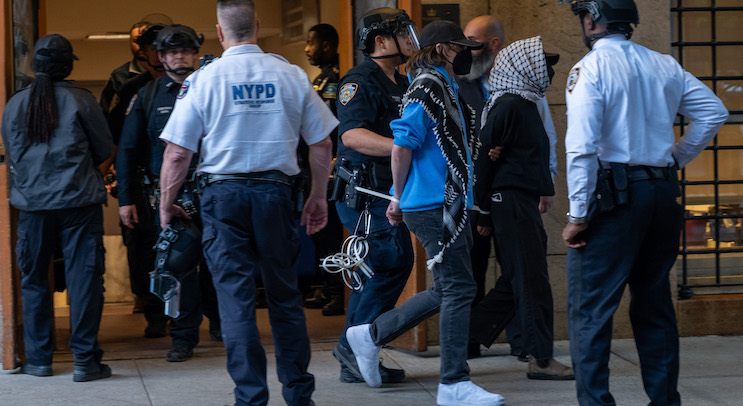There wasn’t much learning going on at Columbia yesterday, but the school provided an important lesson in hypocrisy for those paying attention. A key talking point from defenders of the universities against the Trump administration’s enforcement of civil-rights law has been: If the schools crack down on pro-Hamas protesters at the government’s behest, it will destroy academic freedom as we know it.
I’ve explained in the past why that argument is specious: The anti-Zionists have been erasing academic freedom on campus for decades and punishing the offenders will help to restore it. But honestly I couldn’t have made it much clearer than the fanatical tentifada mobs just did themselves when they stormed Butler Library and forced nearly a thousand students to stop studying for their final exams.
The first characteristic of yesterday’s chaos was that it was nothing new: It was far from the first time students, even at Columbia specifically, had taken over buildings. It was far from the first time these crowds had disrupted academic environments: Classes have been invaded and hijacked, students taking exams have been disrupted (try concentrating on your exam while a rabid mob outside your classroom window is psychotically chanting that you deserve to be murdered because you’re a Jew), libraries have been taken over by protesters, students have been blocked from attending class and moving freely about the campus.
What these groups did yesterday at Columbia is, simply, what these groups do. There was no escalation, in other words. This is just what defenders of the tentifada groups have been defending all along.
Here is how new Columbia President Claire Shipman described the scene she witnessed:
“I spent the late afternoon and evening at Butler Library, as events were unfolding, to understand the situation on the ground and to be able to make the best decisions possible. I arrived to see one of our Public Safety officers wheeled out on a gurney and another getting bandaged. As I left hours later, I walked through the reading room, one of the many jewels of Butler Library, and I saw it defaced and damaged in disturbing ways and with disturbing slogans. Violence and vandalism, hijacking a library—none of that has any place on our campus.”
So that’s what’s new—the idea that now, finally, these are not Columbia values.
Shipman continued:
“I am particularly heartbroken, and incensed, that this disruption occurred when our students are intensely focused on critical academic work. At a moment when our community deserves calm and the opportunity to study, reflect, and complete the academic year successfully, these actions created unnecessary stress and danger. I have seen how much our community wants to take back our narrative, to do what they came to Columbia to do—learn, thrive, and grow—not take over a library.”
That part is still up in the air, is it not? Whether the Columbia “community” wants to learn, or at least to change the narrative. It does seem as though Shipman wants to change the narrative.
That narrative has been carefully crafted by the protesters over the past year and a half. They have not spent any energy disproving the allegations against them, and last night they were beyond parody. The main protest group, Columbia University Apartheid Divest, put out a message in the middle of the standoff reiterating their cowardice and victim complex, whining that they “refuse to show our IDs under militarized arrest.”
The good news, I suppose, is that that statement proves that nobody in that group has ever been under actual militarized arrest.
Eighty of them were, however, eventually put under regular old arrest once the NYPD got involved. Before that, the school’s security team had done something remarkably wise: They refused to let protesters leave the “occupation” unless they showed their identification. Suddenly, the masks and keffiyehs were useless. These kids weren’t under some kind of Beijing-style surveillance state with facial recognition technology condemning them to a life of low social-credit scores. They were just dime-a-dozen thugs.
Even the groups who are usually highly defensive of the tentifada movement popped up with milquetoast statements about the students having gone too far. The Foundation for Individual Rights and Expression (FIRE) quietly tsk-tsked the bad behavior. But it would have been nice had the “academic freedom” groups been leading the fight on campus to restore the academic freedom of the Jewish students under siege. Had they done so—had they cared enough about academic freedom to protect it from campus Hamasniks—they wouldn’t be fighting to restore hundreds of millions of dollars in funding to Harvard and Columbia and the rest. Alas, here we are.


















